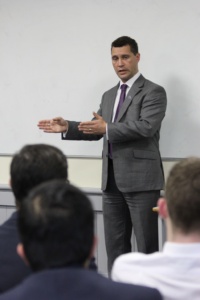An Audience with UKIP’s Steven Woolfe MEP (Sixth Form)
 UKIP MEP Steven Woolfe certainly headed off any hostile audience members from the start of his visit to Cheadle Hulme School’s Politics society, Think Tank , asking the back row whether they were preparing themselves to pelt him with rotten tomatoes. Unfortunately this was not what I, and many others, were expecting. Given that Nigel Farage, leader of UKIP, has recently been condemned almost universally for his comments that one “would be concerned if a group of Romanians moved in next door”, I was expecting similar comments from Steven Woolfe that would only embolden my dislike of UKIP and everything I believe it represents.
UKIP MEP Steven Woolfe certainly headed off any hostile audience members from the start of his visit to Cheadle Hulme School’s Politics society, Think Tank , asking the back row whether they were preparing themselves to pelt him with rotten tomatoes. Unfortunately this was not what I, and many others, were expecting. Given that Nigel Farage, leader of UKIP, has recently been condemned almost universally for his comments that one “would be concerned if a group of Romanians moved in next door”, I was expecting similar comments from Steven Woolfe that would only embolden my dislike of UKIP and everything I believe it represents.
Yet Steven Woolfe spoke powerfully and compellingly in defence of democracy, grammar schools and a points-based immigration system that does not shut the UK out of Europe, but opens us up to the world. Mr Woolfe (perhaps a touch over-dramatically) associated UKIP with, among others, the Suffragettes and those massacred at Peterloo, equating their struggles for democracy with UKIP’s attempts to wrench sovereignty back from the EU. He condemned the unelected clique in Brussels, who restrain UK democracy and also spoke – very movingly in my opinion – on the need for new grammar schools, which would offer some chance of social mobility for many.
Sure, he made some mistakes, but so do all politicians (Ed Miliband take note). His criticism of racist UKIP members implied genuine revulsion at their actions and his argument that UKIP do not have the funds to risk a court case with racist members (unlike Labour and the Conservatives) was a fair and practical point that went no way to legitimizing their racism. Yet, this was partly undermined by Mr Woolfe’s defence of Mr Farage’s comments on Romanians, using the idea that he was tired: this is evidently an inadequate excuse. Moreover, UKIP’s economic policies still seem weak; the idea that all UKIP policies can magically be funded by cutting foreign aid and leaving Europe still seems like an easy deflection of genuine monetary issues.
Yet, all this is not to detract from the cogency with which Mr Woolfe spoke. He came across as a genuine politician, who actually joined politics not because he wanted to (he admitted himself) but because he thought it was necessary to preserve UK democracy. In the light of media coverage of UKIP, I was determined to pick holes in his speech and to challenge the anti-liberalism which I believed he would embody. He came across a whole lot better than I had thought he would or – if I’m being completely honest – than I had hoped he would.
Something had clearly gone wrong with my plan.
Upper Sixth student, Class of 2015


